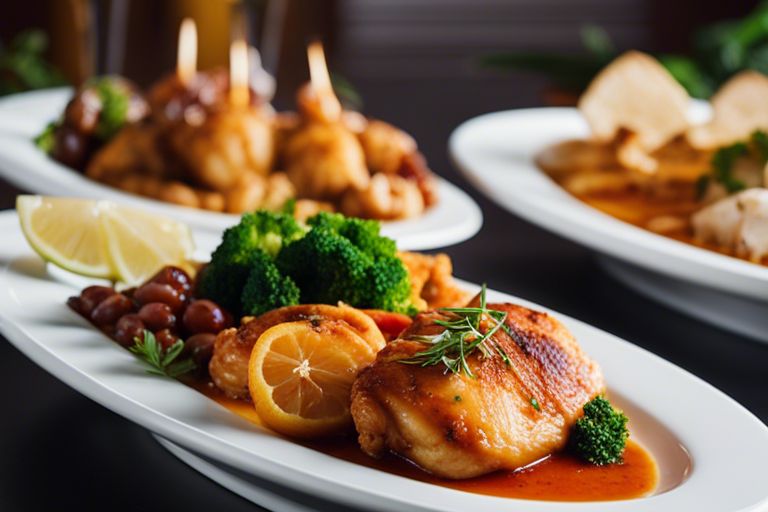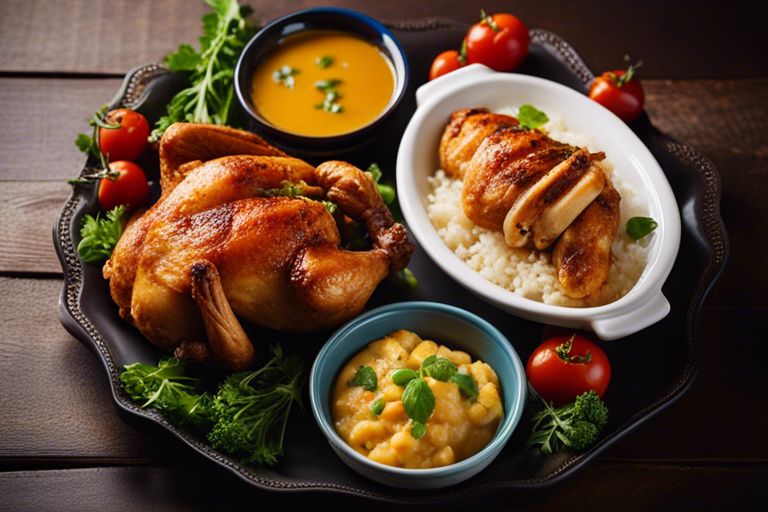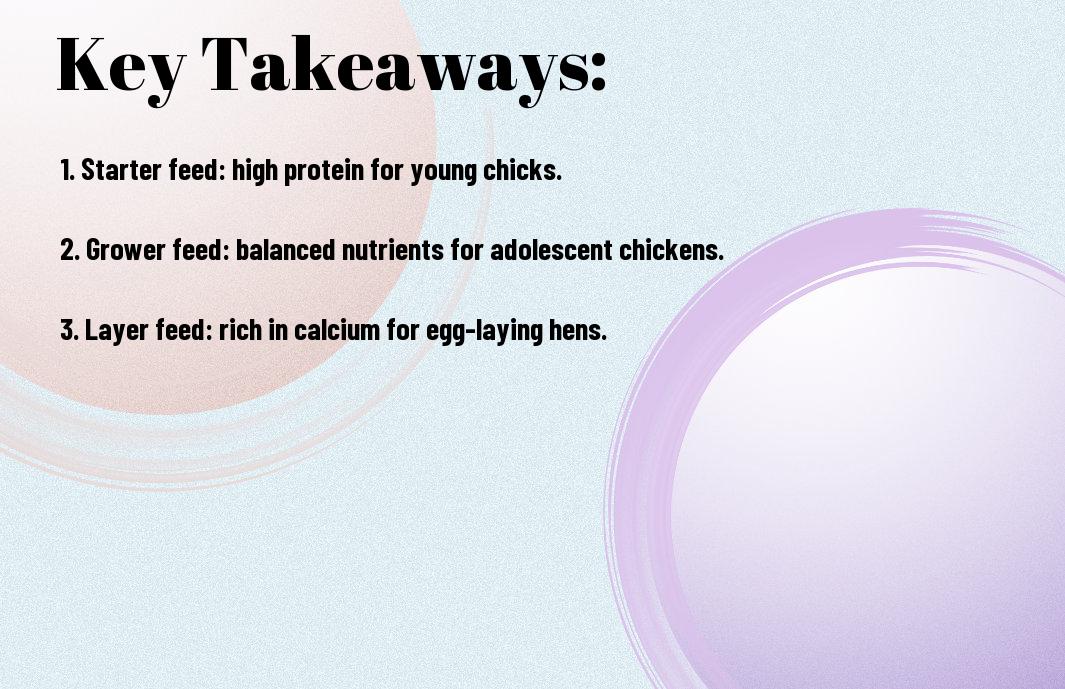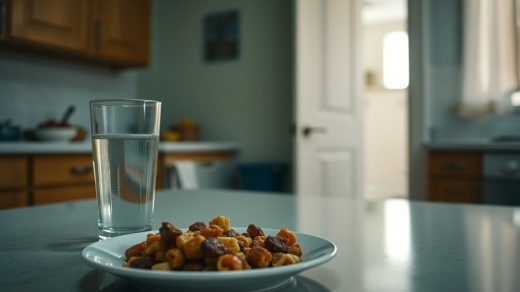Types of chicken food are important to ensure your feathered friends stay healthy and happy. Just like humans, chickens also need a balanced diet to thrive. In this blog post, you will discover the three main types of chicken food that you can provide to your flock. By understanding and incorporating these types of chicken food into their diet, you can promote their overall well-being and egg production.
Key Takeaways:
- Whole grains: Whole grains form a crucial part of a chicken’s diet providing necessary energy and nutrients.
- Protein sources: Protein sources such as mealworms, crickets, or soybeans are important for muscle development and overall health of chickens.
- Fruits and Vegetables: Fruits and vegetables offer important vitamins and minerals, aiding in boosting the immune system and promoting overall well-being in chickens.
Types of Chicken Food
For those who are new to raising chickens, understanding the different types of food they need is crucial for their health and productivity. There are three main types of chicken feed: layer feed, starter feed, and finisher feed. Each type is formulated to meet the specific nutritional needs of chickens at different stages of their life.
- Layer Feed
- Starter Feed
- Finisher Feed
Assume that you want to learn more about the specific requirements of these different feeds, head over to What Are The Different Types of Chicken Feed?
Layer Feed
On the table below, you can see a breakdown of the nutritional requirements for layer feed:
| Protein | Calcium |
|---|---|
| 16% | 3.5%-4% |
| 3.5%-4% | 4.5%-5% |
| 4.5%-5% | 16%-20% |
| 16%-20% | 0.6% |
| 0.6% | 1% |
Starter Feed
With starter feed, the nutritional requirements differ as chickens are in the early stages of life. This feed is formulated to provide the necessary nutrients for growth and development. It typically contains higher levels of protein and vital vitamins and minerals to support the young chickens.
Feed your chicks starter feed for the first 6-8 weeks of their lives to ensure they get the best start in life. This feed helps them establish a healthy foundation for growth and prepares them for transitioning to other types of feed.
Finisher Feed
Finisher feed is designed for chickens that are nearing the end of their growth cycle. This feed contains lower protein levels and helps chickens maintain a healthy weight while providing vital nutrients. It is crucial to switch to finisher feed when your chickens are close to reaching maturity to support their overall health and well-being.
Finisher feed is typically fed to chickens for the final 2-4 weeks before processing or when they reach the desired weight for meat production. This feed helps them develop the right amount of muscle and fat for high-quality meat production.
Chicken food is not one-size-fits-all, and understanding the specific needs of your chickens at different stages of their life is vital for their overall health and productivity.

Nutritional Requirements
While feeding your chickens, it’s crucial to understand their nutritional requirements to ensure they stay healthy and productive. Meeting their dietary needs will help them grow properly, produce quality eggs, and maintain overall well-being.
Protein Content
Content
Protein is an crucial nutrient for chickens as it assists in the development of feathers, muscles, and egg production. A typical laying hen requires around 16% to 18% protein in their diet. To meet this requirement, you can feed them a balanced diet that includes ingredients such as soybean meal, fishmeal, or dried insects.
Calcium and Phosphorus
One
Calcium and phosphorus are vital for eggshell formation and skeletal health in chickens. Laying hens, in particular, need a good source of calcium to produce strong eggshells. You can provide crushed oyster shells or limestone in a separate feeder to ensure they have access to calcium whenever they need it.
Plus
It’s important to maintain the right balance between calcium and phosphorus in your chicken’s diet. Too much phosphorus can interfere with calcium absorption, leading to health issues like soft eggshells. Make sure to provide a well-balanced feed or supplement to meet their calcium and phosphorus needs.
Vitamins and Minerals
Minerals
Chickens also require a mix of vitamins and minerals to support their immune system, metabolism, and overall health. Vitamin D is crucial for calcium absorption, while minerals like iron, zinc, and manganese play crucial roles in various bodily functions. Including a variety of fresh fruits, vegetables, and commercial poultry feeds in their diet can help meet these requirements.
Understanding
It’s important to regularly assess your chicken’s dietary needs and adjust their feed accordingly. Monitoring their health, egg production, and behavior can give you clues about whether they are getting the right nutrients. Consulting with a poultry nutritionist can also provide valuable insights into formulating the best diet for your chickens.

Characteristics of Each Type
Layer Feed: Laying Hens’ Needs
All poultry feeds are not created equal. Layer feed is specifically formulated to meet the nutritional needs of laying hens. These feeds are high in calcium to help strengthen eggshells and contain additional vitamins and minerals to support overall hen health. When you feed your laying hens a diet rich in layer feed, you are ensuring that they have the necessary nutrients for optimal egg production and health.
Starter Feed: Chicks’ Development
When you have young chicks, starter feed is necessary for their growth and development. This type of feed is specially designed to provide the right balance of protein, vitamins, and minerals needed for healthy chick development. It’s crucial to provide starter feed to your chicks from day one to support their rapid growth and ensure they have a strong foundation for a healthy life.
Understanding the importance of starter feed for your chicks is key to setting them up for success. By providing them with the necessary nutrients they need during this critical growth period, you are investing in their long-term health and well-being.
Finisher Feed: Broilers’ Growth
An necessary part of raising broiler chickens is feeding them finisher feed during the final stages of their growth. This type of feed is formulated to promote efficient weight gain and muscle development in broilers. Finisher feed typically has a higher protein content to support the rapid growth rate of broilers as they approach market weight.
Feed plays a crucial role in the growth and development of broiler chickens. By providing them with the right balance of nutrients in finisher feed, you can ensure that your broilers reach their full growth potential and produce high-quality meat for consumption.
Ingredients and Additives
Despite the simple image of chicken feed, there’s actually a variety of ingredients and additives that go into making a balanced diet for your flock. Let’s break down the key components that make up your chickens’ food.
Grains and Proteins
For grains and proteins, your chicken feed will typically contain a mix of corn, wheat, soybean meal, and other grains. These ingredients provide the vital carbohydrates and proteins that chickens need to stay healthy and produce eggs. It’s important to ensure that your chicken feed contains a good balance of grains and proteins to meet your flock’s nutritional needs.
Vitamins and Minerals Supplements
One important aspect of chicken feed is the inclusion of vitamins and mineral supplements. These additives ensure that your chickens are getting all the necessary nutrients for optimal health and egg production. Vitamins such as A, D, E, and B-complex, as well as minerals like calcium and phosphorus, are crucial for your chickens’ overall well-being.
With the right vitamins and minerals in their diet, your chickens will have strong bones, healthy feathers, and good eggshell quality. It’s important to choose a feed that is specifically formulated to meet the needs of your chickens at different stages of life, whether they are chicks, layers, or broilers.
Antibiotics and Hormones: Pros and Cons
On the topic of antibiotics and hormones in chicken feed, there are both pros and cons to consider. Here’s a breakdown of the advantages and disadvantages:
| Pros | Cons |
| Help prevent and treat diseases | Potential for antibiotic resistance |
| Can improve growth and feed efficiency | Concerns about hormone residues in meat and eggs |
| May reduce mortality rates | Environmental impact of antibiotic use |
Vitamins and minerals play a crucial role in the health and well-being of your flock. By ensuring that your chickens receive the necessary supplements in their diet, you can help them lead a healthy and productive life. Remember to choose a high-quality feed that is specially formulated to meet the nutritional needs of your specific flock.
Feeding Strategies
Once again, if you want to probe deeper into the various types of chicken feed available, you can check out this informative article on 9 Types of Chicken Feed Explained. Concerning feeding your chickens, there are different strategies you can adopt based on your preferences and goals.
Free-Range and Organic Options
On your farm, you may opt for free-range or organic chicken feed options. Free-range chickens have access to the outdoors, allowing them to forage for insects and plants in addition to their feed. Organic feed is made from ingredients that are grown without synthetic pesticides or fertilizers. These options can be beneficial if you prioritize natural and sustainable practices in your chicken farming.
Conventional Farming Methods
Options for conventional farming methods include feeding your chickens regular commercial feed that is widely available and formulated to meet the nutritional needs of chickens. This type of feed typically includes a mix of grains, vitamins, and minerals to ensure that your chickens receive a balanced diet.
The conventional method is straightforward and convenient, making it a popular choice for many chicken farmers. If you are looking for a hassle-free approach to feeding your chickens while ensuring they get all the necessary nutrients, this may be the option for you.
Mixing and Matching Feed Types
The strategies for mixing and matching feed types involve combining different feeds to create a custom blend that suits your chickens’ specific needs. This approach allows you to cater to individual preferences, maximize nutritional benefits, or address specific health concerns. You can experiment with various combinations to find the right balance for your flock.
| Option 1 | Option 2 |
| Option 3 | Option 4 |
| Option 5 | Option 6 |
| Option 7 | Option 8 |
| Option 9 | Option 10 |
- Experiment with different feed combinations to find what works best for your chickens.
- Adjust the ratios of each feed type based on your chickens’ response and health indicators.
Assume that by mixing and matching feed types, you can tailor your chickens’ diet to ensure they are healthy and thriving. Experiment with different options until you find the right balance that meets your flock’s needs.
Health Implications
Nutrient Deficiencies
An imperative aspect of keeping your chickens healthy is ensuring they receive the proper nutrients in their diet. An imbalance or deficiency in imperative nutrients can have severe health implications for your flock. For example, a lack of calcium can lead to thin-shelled or soft-shelled eggs, causing potential issues during laying and compromising the overall health of your chickens.
Overfeeding and Obesity
One common mistake that chicken owners make is overfeeding their flock. When you provide excessive amounts of food, your chickens may consume more calories than they can burn off, leading to obesity. This can result in various health problems, such as decreased egg production, joint issues, and an increased risk of other diseases.
This can be harmful to your chickens and may require adjustments to their diet and feeding schedule. Monitor your chickens’ body condition regularly to ensure they stay in a healthy range and adjust their food intake as needed.
Disease Prevention and Treatment
Nutrient deficiencies can also weaken your chickens’ immune system, making them more susceptible to diseases. By ensuring they receive a balanced diet rich in imperative nutrients, you can help boost their immune response and prevent common poultry illnesses. Additionally, certain nutrients, such as vitamin C and zinc, play a crucial role in supporting your chickens’ immune system and overall health.
A healthy diet and proper nutrition are vital factors in preventing diseases in your flock. By providing your chickens with a well-balanced diet, you can help them maintain optimal health and reduce the risk of illnesses that can impact their well-being.

Summing up
Drawing together, chicken food can be broadly categorized into three main types: starter feed, grower feed, and layer feed. It is crucial to select the right type of feed depending on the stage of your chicken’s life to ensure they receive the appropriate nutrients for growth and health. By understanding the nutritional needs of your chickens and providing them with the right type of feed, you can help them thrive and produce high-quality eggs or meat.
Q: What are the 3 types of chicken food?
A: The three types of chicken food are:
- Starter feed: This is a type of feed specially formulated for chicks, usually up to 8 weeks old. It is high in protein and necessary nutrients for growth.
- Grower feed: This feed is designed for adolescent chickens, typically from 8 weeks to 16 weeks old. It has a balanced amount of protein and other nutrients to support healthy development.
- Layer feed: Layer feed is for adult hens that are laying eggs. It contains higher levels of calcium and other vitamins to support egg production and shell quality.

